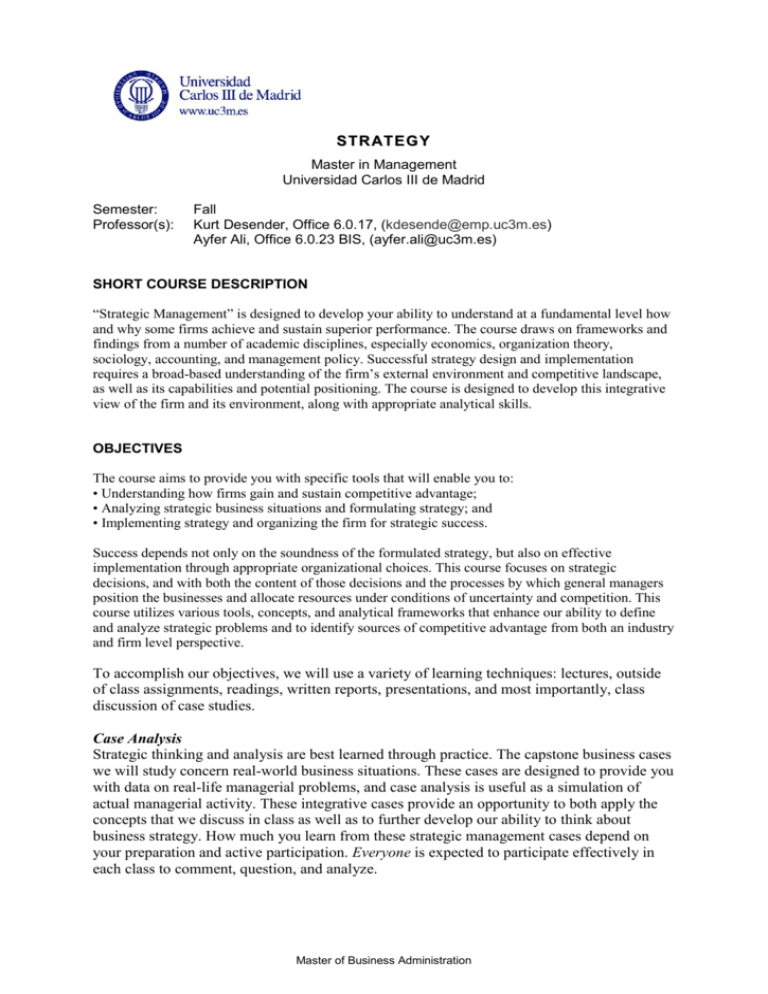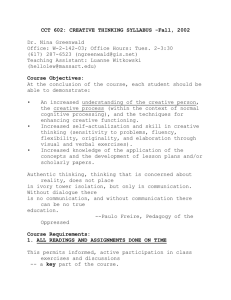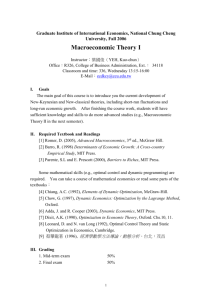
S T R AT E G Y
Master in Management
Universidad Carlos III de Madrid
Semester:
Professor(s):
Fall
Kurt Desender, Office 6.0.17, (kdesende@emp.uc3m.es)
Ayfer Ali, Office 6.0.23 BIS, (ayfer.ali@uc3m.es)
SHORT COURSE DESCRIPTION
“Strategic Management” is designed to develop your ability to understand at a fundamental level how
and why some firms achieve and sustain superior performance. The course draws on frameworks and
findings from a number of academic disciplines, especially economics, organization theory,
sociology, accounting, and management policy. Successful strategy design and implementation
requires a broad-based understanding of the firm’s external environment and competitive landscape,
as well as its capabilities and potential positioning. The course is designed to develop this integrative
view of the firm and its environment, along with appropriate analytical skills.
OBJECTIVES
The course aims to provide you with specific tools that will enable you to:
• Understanding how firms gain and sustain competitive advantage;
• Analyzing strategic business situations and formulating strategy; and
• Implementing strategy and organizing the firm for strategic success.
Success depends not only on the soundness of the formulated strategy, but also on effective
implementation through appropriate organizational choices. This course focuses on strategic
decisions, and with both the content of those decisions and the processes by which general managers
position the businesses and allocate resources under conditions of uncertainty and competition. This
course utilizes various tools, concepts, and analytical frameworks that enhance our ability to define
and analyze strategic problems and to identify sources of competitive advantage from both an industry
and firm level perspective.
To accomplish our objectives, we will use a variety of learning techniques: lectures, outside
of class assignments, readings, written reports, presentations, and most importantly, class
discussion of case studies.
Case Analysis
Strategic thinking and analysis are best learned through practice. The capstone business cases
we will study concern real-world business situations. These cases are designed to provide you
with data on real-life managerial problems, and case analysis is useful as a simulation of
actual managerial activity. These integrative cases provide an opportunity to both apply the
concepts that we discuss in class as well as to further develop our ability to think about
business strategy. How much you learn from these strategic management cases depend on
your preparation and active participation. Everyone is expected to participate effectively in
each class to comment, question, and analyze.
Master of Business Administration
Group Work
Discussing cases and preparing analyses outside of class helps to deepen your knowledge
about strategic management. Group work will be essential for the major group project.
Exam
There will be an in-class (closed-book) final exam. This exam will test both your mastery of the
concepts and your ability to apply them.
Individual Participation
Active participation in the class is an essential part of the learning experience. You are expected to
contribute both to the case discussion and to discussion during the lecture sessions.
EVALUATION CRITERIA
25+20% Exam (Final and Mid-term)
30 % Course Project
25 % Class Participation and Assignments
REFERENCE BOOKS
Grant, R. Contemporary strategy analysis, 7th edition. Wiley. (This is an excellent book that covers
all major issues in strategic management. I strongly recommend you to buy a copy).
Besanko, D., Dranove, D., Shanley, M., and Schaefer, S., Economics of Strategy, 5th edition.
Wiley & Sons. (Selected chapters only. This book illustrates how economics can be used to formulate
strategies.)
Material distributed during the course (articles, case studies, etc.). Available at Aula Global 2.
ADVANCING YOUR KNOWLEDGE
General introduction into Strategy:
- Porter, M. (1996) "What is Strategy?" Harvard Business Review, November-December
- Porter (1979) How Competitive Forces Shape Strategy, Harvard Business Review
For students with an Economics background, I highly recommend the following book that illustrates
how economics can be used to formulate strategies:
- Besanko, D., Dranove, D., Shanley, M., and Schaefer, S., Economics of Strategy, 5th edition. Wiley
& Sons.
For a more in depth understanding of the Corporate Governance aspect of Strategy: Larcker & Tayan.
Corporate Governance Matters: A Closer Look at Organizational Choices and Their Consequences.
Pearson Prentice Hall.
Master of Business Administration
D E T AI L E D P R O G R AM O F T H E C O U R S E
Class 1: Introduction to Strategy
Readings:
Grant, R. Ch1
Michael E. Porter, "What is Strategy?" Harvard Business Review, November-December
1996, Reprint #96608(*)
Assignment Questions:
1. What is Strategy?
2. In Porter's view, what is the difference between Operational Effectiveness & Strategy?
3. What is the role of tradeoffs in Operational Effectiveness & Strategy?
Class 2: Goals, Objectives and Performance
Readings:
Grant, R. Ch2
Cases/Exercises:
Madonna(*)
1. What was Madonna´s goal/mission statement
2. What was her strategy to achieve that goal? Was she successful?
Class 3: Industry Analysis
Readings:
Besanko et al. Industry Analysis. Ch8
Grant R. Ch 3.
Cases/Exercises:
Cola Wars Continued: Coke vs. Pepsi in the 21st Century (HBS 9-702-442) (*)
Assignment Questions:
1. Why is the soft drink industry so profitable?
2. Compare the economics of the concentrate business to the bottling business: why is
the profitability so different? Why are concentrate producers integrating into bottling?
3. How has the competition between Coke and Pepsi affected the industry's profits? Has
competition between the two companies in emerging markets differed substantially from
competition in the United States?
4. Will Coke and Pepsi sustain their profits? What would you recommend to Coke to
ensure its success? To Pepsi?
Class 4: Value Creation through Low Cost
Readings:
Grant, R. Ch9.
Cases/Exercises:
Walmart (*)
Master of Business Administration
Assignment Questions:
1. How does Walmart create value?
2. Why can´t Walmart´s competitors be as successful?
3. What are Walmart´s long term prospects? Why?
Class 5: Value Creation through Focused Differentiation
Readings:
Grant, R. Ch10.
Cases/Exercises:
Ducati (HBS 9-701-132) (*)
Assignment Questions:
1. How does Ducati create value?
2. What is the economic logic behind Minoli¿s turnaround efforts? In which ways have
they been successful & unsuccessful?
3. Should Ducati get into cruisers?
Class 6: Innovation and Product Development
Readings:
Demoratizing Innovation, chapter 1, 2 and 7
http://web.mit.edu/evhippel/www/democ1.htm
Case: TBA
Class 7: Review and Midterm
Class 8: Sustainability and Industry Transformation
Readings:
Pankaj Ghemawat, "Sustaining Superior Performance" (*)
Cases/Exercises:
Kodak and the digital revolution (optional)
The Cirque du Soleil (*)
Assignment Questions:
1. In Ghemawat¿s view, what are the major threats to sustainability?
2. Why did Kodak fail to benefit from the digital revolution?
3. What are the most likely threats to the sustainability of Ryanair¿s competitive
advantage?
Class 9: Vertical Integration
Readings:
Grant, R. Ch 13.
Cases/Exercises:
a) Zara: Fast fashion(*)
Master of Business Administration
Assignment Questions:
1. How does Zara use a vertical integrated structure to create a competitive advantage?
Class 10: Diversification
Readings:
Grant, R. Ch14
Cases/Exercises:
Frietag (*)
Assignment Questions:
1. What are the sources of Frietag¿s differentation?
2. What is the evolution of Frietag¿s strategy?
3. What are the most likely threats to the sustainability of Frietag¿s competitive
advantage?
Class 11: Internationalization
Readings:
Grant, R. Ch15.
Cases/Exercises:
Zara - International Expansion / Grolsh (*)
Assignment Questions:
Class 12: Organizational Design, Corporate Governance and Strategic Leadership
Readings:
Models of corporate governance : who is the fairest of them all ?
How can you tell a good board of directors from a bad one? - The Economist
Cases/Exercises:
HP/Repsol/Apple (*)
Assignment Questions:
Class 13: Current issues + Project Presentations
Class 14: Project Presentations + Review
Master of Business Administration








